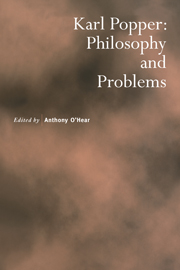Book contents
- Frontmatter
- Contents
- Introduction
- Popper, Science and Rationality
- Popper and Reliabilism
- The Problem of the Empirical Basis
- ‘Revolution in Permanence’: Popper on Theory-Change in Science
- Popper's Contribution to the Philosophy of Probability
- Propensities and Indeterminism
- Popper on Determinism
- Popper and the Quantum Theory
- The Uses of Karl Popper
- Popper and Darwinism
- Popper and the Scepticism of Evolutionary Epistemology, or, What Were Human Beings Made For?
- Does Popper Explain Historical Explanation?
- The Grounds for Anti-Historicism
- What Use is Popper to a Politician?
- Ethical Foundations of Popper's Philosophy
- Works of Karl Popper Referred to in the Text
- Notes on Contributors
- Index
Popper's Contribution to the Philosophy of Probability
Published online by Cambridge University Press: 19 January 2010
- Frontmatter
- Contents
- Introduction
- Popper, Science and Rationality
- Popper and Reliabilism
- The Problem of the Empirical Basis
- ‘Revolution in Permanence’: Popper on Theory-Change in Science
- Popper's Contribution to the Philosophy of Probability
- Propensities and Indeterminism
- Popper on Determinism
- Popper and the Quantum Theory
- The Uses of Karl Popper
- Popper and Darwinism
- Popper and the Scepticism of Evolutionary Epistemology, or, What Were Human Beings Made For?
- Does Popper Explain Historical Explanation?
- The Grounds for Anti-Historicism
- What Use is Popper to a Politician?
- Ethical Foundations of Popper's Philosophy
- Works of Karl Popper Referred to in the Text
- Notes on Contributors
- Index
Summary
Introduction
Popper's writings cover a remarkably wide range of subjects. The spectrum runs from Plato's theory of politics to the foundations of quantum mechanics. Yet even amidst this variety the philosophy of probability occupies a prominent place. David Miller once pointed out to me that more than half of Popper's The Logic of Scientific Discovery is taken up with discussions of probability. I checked this claim using the 1972 6th revised impression of The Logic of Scientific Discovery, and found that of the approximately 450 pages of text, approximately 250 are to do with probability. Thus Miller's claim is amply justified. It seems indeed that the philosophy of probability was one of Popper's favourite subjects, and, as we shall see, Popper certainly enriched the field with several striking innovations. In this area, as in others, Popper held very definite views, and criticized his opponents in no uncertain terms. Popper was an objectivist and anti-Bayesian, and his criticisms were directed against subjectivism and Bayesianism.
As well as carrying out his own research in the philosophy of probability, Popper stimulated interest in the subject among members of his department at the London School of Economics. When I arrived there as a graduate student in 1966, Imre Lakatos was editing a volume on one part of the subject (The Problem of Inductive Logic), and himself wrote a paper for the volume. Imre Lakatos did not return to the subject, but this paper is itself a notable contribution.
- Type
- Chapter
- Information
- Karl PopperPhilosophy and Problems, pp. 103 - 120Publisher: Cambridge University PressPrint publication year: 1996
- 2
- Cited by



